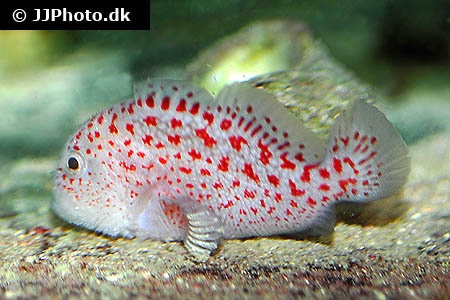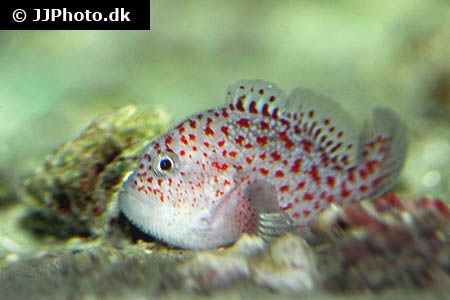Caracanthus maculatus


| Latin name | Caracanthus maculatus - (Gray, 1831) |
|---|---|
| Local name | Spotted coral croucher |
| Family | Scorpaenidae - Caracanthus |
| Origin | East Indian Ocean, West Indian Ocean, Australia, Indonesia, East Pacific, Central/West Pacific |
| Max length | 5 cm (2") |
| Minimum volume |
100 l (26 gal) |
|---|---|
| Hardiness |
Hardy |
| Suitable for aquarium |
Experience, preparation and extra care required |
| Reef safe |
Always reef safe |
| Aggressiveness | Mostly peaceful but might be aggressive towards similar species |
| Recommended |
Small crustaceans (Krill, mysis, artemia...) Zooplankton (Cyclops, pods...) |
|---|
This species is venomous, but it´s toxin is rarely dangerous to humans. It can however cause considerable pain.
In case of poisoning it is vital to have as much information as possible regarding the species/poison. Have telephone numbers for the poison hotline close to the aquarium.
Since different people can have different reactions to poisons, take precautions necessary to ensure personal safety and that of the surroundings.
This poison can be dangerous if suffering from allergies.
It may be necessary to target feed this species, otherwise it might have difficulties to obtain enough food.
This fish requires feeding several times a day, especially when newly added.
When the fish can find its natural food in the aquarium it requires less frequent feeding.
This species likes to hide in and amongst the branches of corals, e.g. Acropora coral and
will also do well if they can find other hiding places.
When these fish lay eggs, they may place them underneath an Acropora or something similar.
The eggs can cause minor damage to the coral's tissue, but normally this will heal again.
This kind of Scorpionfish likes to hide in between the branches of large stony corals, Acropora for example, so make sure to keep them with there corals in the aquarium.
They stay hidden a lot of the time, so they are not seen very often.
Scorpion-/Lionfish (Scorpaenidae) are both pretty and interesting because of their special appearance and behaviour.
They are generally hardy and do not need a large swimming area, but do often require feeding with small live fish and/or shrimps. Some will quickly begin eating frozen fish or shrimp whilst others will refuse to eat "dead" food. Their food must be highly nutritious and varied. They must not be fed too often. Feed them a large meal twice a week.
These fish are mostly peaceful, but will eat anything that fits into their mouth. One might be surprised by how large their prey can be, they can even swallow fish which nearly match their own length. They will also eat each other, if the size difference is large enough. Their venomous spines do not guarantee that they will not be eaten by other predatory fishes.
Do be cautious when having your hands in the aquarium as these fish are very poisonous.
Some Scorpionfish require a special substrate, either coral gravel or fine sand, as this resembles their natural habitat.
Be careful when catching Scorpion-/Lionfish as they can easily get caught in the net.
| Aquarium trade | Yes |
|---|---|
| Distribution | Indo-Pacific: East Indies to the Line, Marquesan, and Austral Islands, north to southern Japan. |
| English common names |
Scarlet-spotted velvetfish Spotted coral croucher Spotted croucher Velvet fish |
Scott W. Michael. 2001. Reef Fishes volume 1 - TFH Publications / Microcosm Ltd. - (English)
Henry C. Schultz. 2002. Scorpionfish: Masters of Camouflage - Reefkeeping Magazine - (English)
Greg and Renee Hix. Scorpionfish in the Home Aquarium - Lionfish Lair - (English)
Greg and Renee Hix. Lionfish in the Home Aquarium - Lionfish Lair - (English)
Daniel Pomfret- 2007. Venomous Beauties: A Look at Scorpionfishes in the Home Aquarium - Tropical Fish Hobbyist Magazine - (English)

